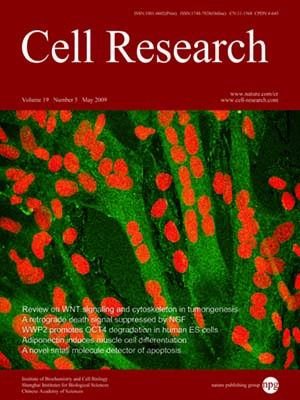
Volume 19, No 5, May 2009
ISSN: 1001-0602
EISSN: 1748-7838 2018
impact factor 17.848*
(Clarivate Analytics, 2019)
Volume 19 Issue 5, May 2009: 546-560
ORIGINAL ARTICLES
A retrograde apoptotic signal originating in NGF-deprived distal axons of rat sympathetic neurons in compartmented cultures
Sue-Ann Mok, Karen Lund and Robert B Campenot
Department of Cell Biology, University of Alberta, 5-14 Medical Sciences Building, Edmonton, Alberta, Canada T6G 2H7
Correspondence: Robert B Campenot,(bob.campenot@ualberta.ca )
Previous investigations of retrograde survival signaling by nerve growth factor (NGF) and other neurotrophins have supported diverse mechanisms, but all proposed mechanisms have in common the generation of survival signals retrogradely transmitted to the neuronal cell bodies. We report the finding of a retrograde apoptotic signal in axons that is suppressed by local NGF signaling. NGF withdrawal from distal axons alone was sufficient to activate the pro-apoptotic transcription factor, c-jun, in the cell bodies. Providing NGF directly to cell bodies, thereby restoring a source of NGF-induced survival signals, could not prevent c-jun activation caused by NGF withdrawal from the distal axons. This is evidence that c-jun is not activated due to loss of survival signals at the cell bodies. Moreover, blocking axonal transport with colchicine inhibited c-jun activation caused by NGF deprivation suggesting that a retrogradely transported pro-apoptotic signal, rather than loss of a retrogradely transported survival signal, caused c-jun activation. Additional experiments showed that activation of c-jun, pro-caspase-3 cleavage, and apoptosis were blocked by the protein kinase C inhibitors, rottlerin and chelerythrine, only when applied to distal axons suggesting that they block the axon-specific pro-apoptotic signal. The rottlerin-sensitive mechanism was found to regulate glycogen synthase kinase 3 (GSK3) activity. The effect of siRNA knockdown, and pharmacological inhibition of GSK3 suggests that GSK3 is required for apoptosis caused by NGF deprivation and may function as a retrograde carrier of the axon apoptotic signal. The existence of a retrograde death signaling system in axons that is suppressed by neurotrophins has broad implications for neurodevelopment and for discovering treatments for neurodegenerative diseases and neurotrauma.
Cell Research (2009) 19:546-560. doi: 10.1038/cr.2009.11; published online 3 February 2009
FULL TEXT | PDF
Browse 1779


